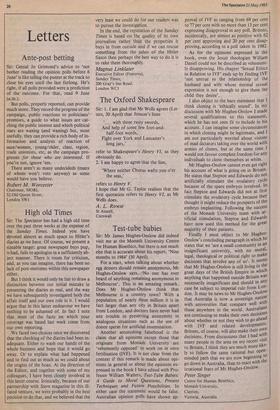Test-tube babies
Sir: Mr James Hughes-Onslow did indeed visit me at the Monash University Centre for Human Bioethics, but there is not much else that is accurate about his report, 'Nine months to 1984' (30 April).
For a start, when talking about whether egg donors should remain anonymous, Mr Hughes-Onslow says, 'No one has ever heard of anything remaining anonymous in Melbourne'. This is an amazing remark. Does Mr Hughes-Onslow think that Melbourne is a country town? With a population of nearly three million it is in fact larger than any city in Britain apart from London, and doctors have never had any trouble in preserving anonymity in analogous situations such as the use of donor sperm for artificial insemination.
Another astonishing falsehood is the claim that all opinions except those that originate from Monash University are 'vehemently opposed' to work on in vitro fertilisation (IVF). It is not clear from the context if this remark is made about opi- nions in general or about the opinions ex- pressed in the book I have edited with Pro- fessor William Walters, Test-Tube Babies: A Guide to Moral Questions, Present Techniques and Future Possibilities. In either case the statement would be false. Australian opinion polls have shown ap-
proval of IVF as ranging from 69 per cent to 77 per cent with no more than 13 per cent expressing disapproval in any poll. Britons, incidentally, are almost as positive with 62 per cent approving and 20 per cent disap- proving, according to a poll taken in 1982.
As for the opinions expressed in the book, even the Jesuit theologian William Daniel could not be described as vehement- ly disapproving. His chapter 'Sexual Ethics in Relation to IVF' ends up by finding IVF `not untrue to the relationship of the husband and wife whose normal sexual expression is not enough to give them the child they desire'.
I also object to the bare statement that I think cloning is 'ethically sound'. In my discussion with Mr Hughes-Onslow I made several qualifications to this statement, which he has not seen fit to include in his account. I can imagine some circumstances in which cloning might be legitimate, and I am not particularly worried about visions of mad dictators taking over the world with armies of clones, but at the same time I would not favour complete freedom for any individuals to clone themselves at whim.
Mr Hughes-Onslow cannot even get right his account of what is going on in Britain. He states that Steptoe and Edwards do not artificially stimulate the ovulatory cycle because of the spare embryos involved. In fact Steptoe and Edwards did not at first stimulate the ovulatory cycle because they thought it might reduce the prospects of the embryo implanting. Following the success of the Monash University team with ar- tificial stimulation, Steptoe and Edwards have now used this method for the great majority of their patients.
Finally I must object to Mr Hughes- Onslow's concluding paragraph in which he states that we 'are a small community in an insignificant university, with no moral, legal, theological or political right to make decisions that involve any of us'. It seems that Mr Hughes-Onslow is still living in the great days of the British Empire in which anything that happened outside Britain was necessarily insignificant and should in any case be subject to imperial rule from Lon- don. It may be news to Mr Hughes-Onslow that Australia is now a sovereign nation with universities that compare well with those anywhere in the world. Australians are continuing to make their own decisions about whether or not they wish to go ahead with IVF and related developments. Britons, of course, will also make their own decisions. From discussions that I had with many people in the area on my recent visit to Britain, I think they are much more like- ly to follow the same rational but open- minded path that we are now beginning to go down in Australia, than to react with the irrational fears of Mr Hughes-Onslow.
Peter Singer
Centre for Human Bioethics, Monash University, Clayton, Victoria, Australia










































 Previous page
Previous page